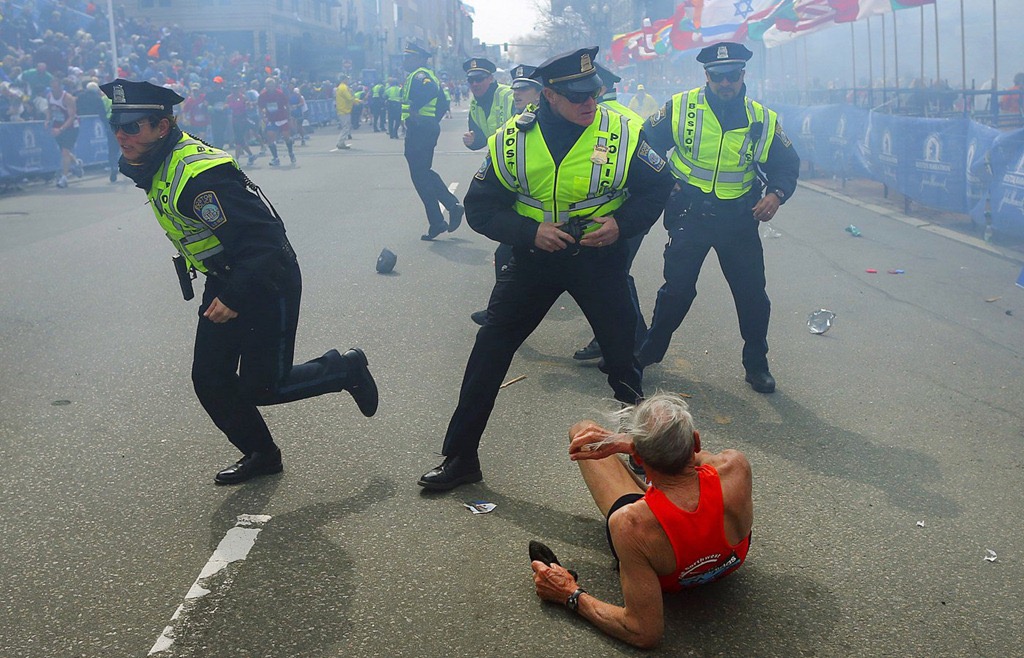^zhurnaly - Random - Recent - Running - Mantra - Tarot - Om - Help
^zhurnaly v.0.9940

Howdy, pilgrim! No ads — you're in the ^zhurnal (that's Russian for "journal") — see ZhurnalyWiki for a Wiki edition of individual items; see Zhurnal and Zhurnaly for quick clues as to what this is all about; see Random for a random page. Briefly, this is the diary of ^z = Mark Zimmermann ... previous volume = 0.9939 ... complete list at bottom of page ... send comments & suggestions to "z (at) his (dot) com" ... click on a title link to go to that item in the ZhurnalyWiki where you can edit or comment on it ... thank you!
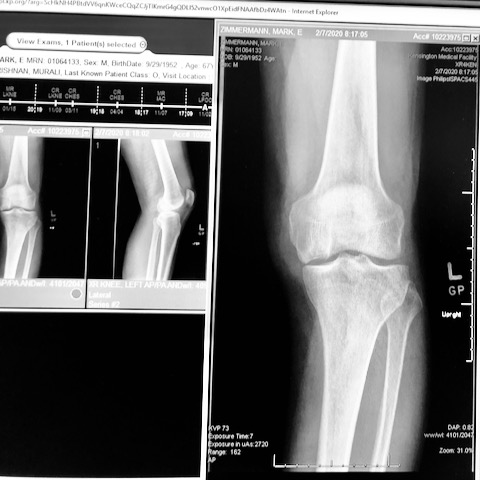 | Strange new twinges began in the left knee at mile 10 of the Stone Mill 50 Miler on 9 November 2019. Pokey, ever the optimist, walks on another 5 miles to the next major aid station. He plans to stagger back to the starting line from there along sidewalks for another half-dozen or so miles, but a sudden sharp pain explains the foolishness of that notion.
So after resting a week, he tries the Richmond Marathon on 16 Nov. The first few miles aren't bad, but then the left knee begins to complain. At mile 9 he sends buddies Square Peg and Danger Man on ahead to finish. His stiff-legged walk along the course to mile 16 is slow and painful. |
"Old guy reports knee aches — likely arthritis!" Medical consultation and initial x-ray on the day of Stone Mill shows nothing of significance except calcification. So Pokey keeps walking on the leg, occasionally using trekking poles in a vain bid for sympathy from colleagues at the office. Finally after further visits to the doctor an MRI taken at 0130 on 15 January reveals:
"... Large osteochondral fracture of the weightbearing portion of the medial femoral condyle ... Medial meniscal tearing including a radial tear of the posterior root ... Grade 2 MCL injury ... Sprains of the ACL and PCL ... Low-grade injury or sprain of the MPFL/medial patellar retinaculum ... Degeneration or sprains of the proximal attachment of the fibular collateral ligament and the distal attachment of the IT band ... Periarticular muscle strains ... Background of minimal degenerative changes ... Moderate to large joint effusion with synovitis and intra-articular debris ... Soft tissue edema about the knee. ..."
Let the Pity Party begin! Now on crutches for 6 weeks or more, Pokey aspires to heal. X-Rays taken on 7 February show the bones beginning to knit. (Or maybe they're purling?!) | 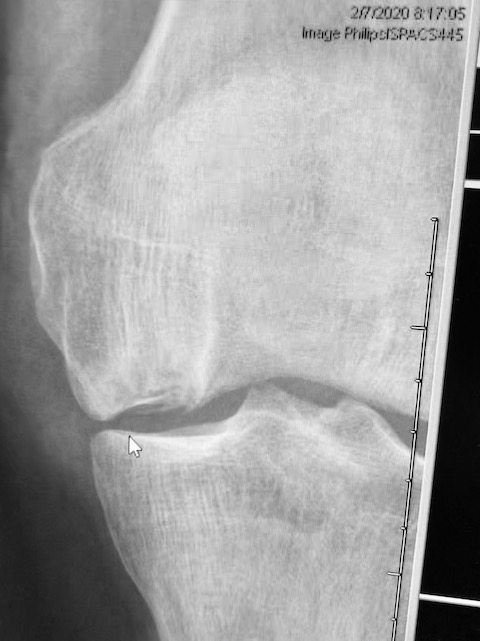 |
(cf Torn Toe Tendon Repair (2005-05-05), Humerus Fracture (2008-10-15), Bend Sinister (2008-10-24), ...)
- Wednesday, February 12, 2020 at 06:44:18 (EST)
An idiom that can mean the opposite of itself: "... a face that could stop a clock ..." — i.e., somebody incredibly ugly or incredibly beautiful!
(cf lyrics to John Mellencamp song "Pink Houses"; cf 2019-10-06 - Metric Marathon, ...)
- Tuesday, February 11, 2020 at 06:05:15 (EST)
Another amazingly-beautiful conversation in Middlemarch by "George Eliot" (Mary Evans), Chapter 22, as Will Ladislaw is chatting with protagonist Dorothea Brooke:
"... To be a poet is to have a soul so quick to discern that no shade of quality escapes it, and so quick to feel, that discernment is but a hand playing with finely ordered variety on the chords of emotion—a soul in which knowledge passes instantaneously into feeling, and feeling flashes back as a new organ of knowledge. One may have that condition by fits only."
"But you leave out the poems," said Dorothea. "I think they are wanted to complete the poet. I understand what you mean about knowledge passing into feeling, for that seems to be just what I experience. But I am sure I could never produce a poem."
"You are a poem—and that is to be the best part of a poet—what makes up the poet's consciousness in his best moods," said Will, showing such originality as we all share with the morning and the spring-time and other endless renewals.
"I am very glad to hear it," said Dorothea, laughing out her words in a bird-like modulation, and looking at Will with playful gratitude in her eyes. "What very kind things you say to me!"
(cf Remember Me (1999-05-21), My Religion (2000-11-06), Terrible Obstacles (2000-11-17), Painting versus Writing (2006-03-29), Hearing the Grass Grow (2020-02-08), ...)
- Monday, February 10, 2020 at 06:06:54 (EST)
Three variations on a legendary sixth century encounter between a traveling monk and an emperor — first, from Wikipedia's article Bodhidharma (citing Jeffrey Broughton):
Emperor Wu: "How much karmic merit have I earned for ordaining Buddhist monks, building monasteries, having sutras copied, and commissioning Buddha images?"
Bodhidharma: "None. Good deeds done with worldly intent bring good karma, but no merit."
Emperor Wu: "So what is the highest meaning of noble truth?"
Bodhidharma: "There is no noble truth, there is only emptiness."
Emperor Wu: "Then, who is standing before me?"
Bodhidharma: "I know not, Your Majesty."
... and as translated in [1] (Shobogenzo, Hubert Nearman):
When the First Ancestor arrived at the city of Chinling, he had an audience with Emperor Wu of Liang, whereupon the emperor said to him, "Since the time when I ascended to the throne, I have so excelled in building temples, in copying the Scriptures, and in permitting both men and women to become monks that my deeds must be quite beyond anyone's ability to keep a record of. So what merit have I accrued?"
The Master replied, "There is no merit in any of these."
Dumbfounded, the emperor asked, "Why, pray, are they lacking in merit?"
The Master replied, "Such deeds are merely the results achieved by ordinary people and those in lofty positions who follow the Lesser Course. Such seeking after merit defiles one's deeds. It is like a shadow following a form: even though it exists, it is not the real thing."
The emperor then asked, "What, pray, is true merit?"
The Master answered, "One's immaculately wise discernment being wondrous and fully realized, and one's body being naturally unbounded and tranquil. Merit like this is not sought by the worldly-minded."
The emperor then asked, "What is the paramount Truth of the Holy Teachings?"
The Master replied, "Since the Truth is devoid of any limits, It is beyond holiness."
The emperor then demanded, "And who, pray, is this one who is confronting my royal presence?"
The Master replied, "I do not personally know that One."
... and at [2] and [3]:
Emperor Wu: "I have built many temples, copied innumerable Sutras and ordained many monks since becoming Emperor. Therefore, I ask you, what is my merit?"
Bodhidharma: "None whatsoever!"
Emperor Wu: "Why no merit?"
Bodhidharma: "Doing things for merit has an impure motive and will only bare the puny fruit of rebirth."
Emperor Wu, a little put out: "What then is the most important principle of Buddhism?"
Bodhidharma: "Vast emptiness. Nothing sacred."
Emperor Wu, by now bewildered, and not a little indignant: "Who is this that stands before me?"
Bodhidharma: "I do not know."
(cf Nothing But Faith in Nothing (2014-09-07), Mantra - Vast Emptiness Everything Sacred (2015-03-17), No Knowing (2017-02-20), Nothing, Sacred (2018-06-07), ...)
- Sunday, February 09, 2020 at 06:37:55 (EST)
"... if we had a keen vision and feeling
of all ordinary human life,
it would be like hearing the grass grow
and the squirrel's heart beat,
and we should die of that roar
which lies on the other side of silence. ..." |
... from Middlemarch by George Eliot (Mary Evans), Chapter XX.
(cf Remember Me (1999-05-21), My Religion (2000-11-06), Terrible Obstacles (2000-11-17), Painting versus Writing (2006-03-29), ...)
- Saturday, February 08, 2020 at 05:35:48 (EST)
Legal terminology is so much fun — and often, when examined, can offer life lessons on how to handle real-world challenges. Force majeure, for instance, cancels a contractual promise or excuses a delay in the face of an overwhelming event like revolution, war, riot, crime, or similar unforeseeable happening. And beyond even force majeure are Acts of God, unpredictable natural phenomena like earthquakes or tsunami that permit a breach of contract. (Though things that were formerly "Acts of God" may now be caused by mortal Man, like fracking-triggered seismic activity.)
And in the opposite direction is the concept of de minimis, something triflingly small, like roundoff error in a well-defined measurement. As per the Latin proverb, aquila non capit muscas — the eagle does not catch flies. That's beneath notice; we've got better things to do!
(cf Pacer Debate (2008-12-12), ...)
- Thursday, February 06, 2020 at 06:29:25 (EST)
Tovarka-sensei (SMB) points out that the epistemological-metacognitive trio "See Clearly + Know Deeply + Choose Wisely" aligns closely with the three dimensions of a famous prayer of more than a century ago, inspired by Richard of Chichester (1197-1253):
Thanks be to Thee, my Lord Jesus Christ
For all the benefits Thou hast given me,
For all the pains and insults Thou hast borne for me.
O most merciful Redeemer, friend and brother,
May I know Thee more clearly,
Love Thee more dearly,
Follow Thee more nearly. |
... and likewise the closely-related song "Day by Day" in the musical Godspell:
Day by day,
O Dear Lord,
Three things I pray:
To see thee more clearly,
Love thee more dearly,
Follow thee more nearly,
Day by day. |
... so beautiful, thoughtful, meaningful!
(cf There Are Three Points (2012-05-06), Think Better - Three Keys (2019-06-05), Three Things Tactic (2019-09-03), ...)
- Wednesday, February 05, 2020 at 06:08:08 (EST)
From page 15 of Letters to Andrew Carnegie, a collection of short "reports" addressed to the wealthy philanthropist on the centennial of his death in 1919, Mary Frances Cooper, President and Director of the Carnegie Library of Pittsburgh, writes:
... I want to make particular mention of the Library staff. They are as wonderful a group of people as you could ever know, and I would posit that they have always been so throughout the decades of our existence. People who work at the public library have passion — for learning, literacy, literature, and for other people. Early on in the history of the library, an effort was made to hire people who were learned, scholarly, and erudite; who were well versed in history, the arts, literature, and the sciences. Today we still hire for education but we look more for kindness, curiosity, and compassion. We want people who can be interested in whatever someone else is interested in, and who will pursue that interest with a passion until the customer is satisfied. ...
(cf Estate Tax (2005-05-06), Philanthropy and Charity (2010-03-28), Vartan Gregorian and Andrew Carnegie (2010-05-05), 2013-04-05 - MBT - Mass Av - 16th St Loop, ...)
- Monday, February 03, 2020 at 06:56:40 (EST)
A delicately drawn image of Fred Rogers, fully exposed, from Tom Junod's profile "Can You Say...Hero?" — with strong echoes of Rainer Maria Rilke's powerful poem "Archaic Torso of Apollo":
The old navy-blue sport jacket comes off first, then the dress shoes, except that now there is not the famous sweater or the famous sneakers to replace them, and so after the shoes he's on to the dark socks, peeling them off and showing the blanched skin of his narrow feet. The tie is next, the scanty black batwing of a bow tie hand-tied at his slender throat, and then the shirt, always white or light blue, whisked from his body button by button. He wears an undershirt, of course, but no matter–soon that's gone, too, as is the belt, as are the beige trousers, until his undershorts stand as the last impediment to his nakedness. They are boxers, egg-colored, and to rid himself of them he bends at the waist, and stands on one leg, and hops, and lifts one knee toward his chest and then the other and then... Mister Rogers has no clothes on.
Nearly every morning of his life, Mister Rogers has gone swimming, and now, here he is, standing in a locker room, seventy years old and as white as the Easter Bunny, rimed with frost wherever he has hair, gnawed pink in the spots where his dry skin has gone to flaking, slightly wattled at the neck, slightly stooped at the shoulder, slightly sunken in the chest, slightly curvy at the hips, slightly pigeoned at the toes, slightly aswing at the fine bobbing nest of himself... and yet when he speaks, it is in that voice, his voice, the famous one, the unmistakable one, the televised one, the voice dressed in sweater and sneakers, the soft one, the reassuring one, the curious and expository one, the sly voice that sounds adult to the ears of children and childish to the ears of adults, and what he says, in the midst of all his bobbing nudity, is as understated as it is obvious: "Well, Tom, I guess you've already gotten a deeper glimpse into my daily routine than most people have."
(cf 2018-09-10 - Thank You, Mr Rogers, Mr Rogers Asks (2019-11-18), 143 (2019-11-28), State of Astonishment (2019-12-19), ...)
- Sunday, February 02, 2020 at 05:36:37 (EST)
draft notes for a one-page quick-start "Think Better" module:
"Don't over-interpret the noise!"
- Signals convey information
- Noise is random from natural sources
- Interference is deliberate by adversaries
... in a Nutshell
Observations are imperfect — they come with errors. Clocks may be fast or slow; people lie when asked questions in a poll; sources get confused; cosmic rays flip bits in computer memories; enemies use jammers or camouflage; data compression fuzzes up images; translators introduce ambiguity or overlook nuance. Information theory is the math to describe, in ideal circumstances, signals and noise.
In real-world situations, however, often the math doesn't apply. Sources of noise come and go unpredictably, new phenomena emerge, and deceitful opponents change their strategies to maximize confusion. Instead of blind trust in arcane formulæ, wisest is to be aware and consider:
- How big is the signal compared to the noise? If a signal is weak perhaps filtering, averaging, or other forms of post-processing can help sharpen it — but it may still need to be distrusted, particularly if it doesn't fit other sources. Rather than strenuous work to amplify faint data, often a better approach is to improve collection: get a bigger antenna, take a larger sample, get closer, or ask better questions.
- What characteristics does the noise have? Is it seasonal or directional? Is it concentrated at certain frequencies or in particular modes? Does it ever recede, and can moments of clarity be recognized and taken advantage of?
- Is some of the noise artificial interference from a malicious adversary? If signals are concealed on purpose, then new opportunities appear. Can deliberate noise be analyzed, reverse-engineered, and then subtracted? Might enemies be recruited to turn off the jamming? Could a source of interference be attacked directly?
Remember
Don't over-react! Short-term fluctuations may well be random noise, not indicative of long-term change.
(cf Science and Pseudoscience (2001-10-06), Expert Political Judgment (2010-05-13), Signal and Noise (2012-12-25), Pearl Harbor (2017-10-20), ...)
- Saturday, February 01, 2020 at 04:34:02 (EST)
No secrets: starting with its subtitle "The Life and Faith of Mister Rogers", Shea Tuttle's biography Exactly as You Are (2019) isn't shy about interpreting Fred Rogers in explicit Christian terms. Every chapter hammers hard on theological themes that appear implicitly throughout Mister Rogers Neighborhood. God, specifically seen through Jesus the Christ, is the protagonist. And it's a surprisingly successful vantage point from which to sketch a gentle, kind, very human being.
Tuttle necessarily repeats many anecdotes from other writings about Mister Rogers, but often her perspective is striking. In Chapter 5, "Formation in New York City", she explains the "no" as well as the "yes" in Mr Rogers' 1951 career choice:
Even before Fred's "yes" to television transplanted him to New York, he said another quiet, formative "no" in response to pies in faces: "no" to whatever was the reigning television gimmick of the day. Throughout his almost fifty years in television, Fred said no to every voice (perhaps even some internal ones) that told him that to do such and such would generate better ratings and bigger profits: "no" to picking up the pace; "no" to animation; "no" to licensing of merchandise; "no" to moving Mister Rogers' Neighborhood to network television or even to a bigger city like New York or Los Angeles. And as he said no to greater speed, more money, and higher ratings, he said yes to quieter goods: thoughtfulness, intentionality, and his own intuition and imagination for the work, those very same values that pointed him, that second life-changing Easter, toward television as a force for greater good—and, yes, toward New York.
... and likewise, a bit later in Chapter 7 ("Graduate Studies and Life-Transforming Teachers"), Tuttle explains the positive, life-affirming focus of Mister Rogers via the image of the Good Advocate versus the Evil Accuser. At Western Theological Seminary, Rogers met Bill Orr. As Tuttle quotes from a 1994 speech by Fred Rogers:
Oh, we learned about epistemology and Christology and eschatology and sanctification and justification and existentialism, but most of all we witnessed the unfolding of the life of one of God's saints. Dr. Orr would be quick to remind me that we're all saints, we believers; nevertheless, when you see someone go out to lunch on a winter's day and come back without his overcoat because he had given it to a person who was cold, you have a growing understanding of "living theologically." When we asked Dr. Orr about the coat, he said, "Oh, I have one other at home," and that was all he said about it.
... and from an interview later in 1994, Tuttle quotes Rogers:
My seminary professor, William Orr, who died last year, used to say something like, "Evil would want us to think the worst about who we are, so we would have that behind our eyes as we looked at our neighbor, and we would see the worst in our neighbor. Jesus would want us to see the best of who we are, so we would have that behind our eyes as we looked at our neighbor, and we would see the best in him or her. You can be an accuser or an advocate. Evil would have you be an accuser in this life. Jesus would have you be an advocate for your neighbor."
That statement undergirds all of what I do through the Neighborhood and everything I try to do in living.
... and one final, on-target observation by Shea Tuttle (in Chapter 11, "Neighborhood Liturgy"), about Mister Rogers' and unselfing:
Fred's discipline and intentionality showed up even in his everyday speech. Mister Rogers' Neighborhood was a "program" and never a "show." Children and families "used" rather than "watched" the program; they were not merely passive receivers, and his language acknowledged their agency and activity. Fred avoided the first person, when he could, and he especially avoided the possessive pronoun my. Instead he spoke of "our work" or "our offices" when speaking of his professional life, and when referring to his home life, he always referred to "our sons," "our home," or "our family."
Shea Tuttle's biography ends aptly with Fred Rogers' own words as quoted in a Pittsburgh Magazine article in 2003:
"I think that after we die,
we have this wide understanding
of what's real. And we'll probably say,
'Ah, so that's what it was all about.'" |
(cf 2018-09-10 - Thank You, Mr Rogers, Mr Rogers Asks (2019-11-18), Present in Every Moment (2019-11-25), 143 (2019-11-28), ...)
- Friday, January 31, 2020 at 04:48:08 (EST)
... from an essay by Adam Grant in the 28 March 2019 NY Times titled "Productivity Isn't About Time Management. It's About Attention Management" — with the punchline:
... Prioritize the people and projects that matter, and it won't matter how long anything takes. Attention management is the art of focusing on getting things done for the right reasons, in the right places and at the right moments. ...
... and later Grant, an organizational psychologist at the Wharton School, observes:
... Often our productivity struggles are caused not by a lack of efficiency, but a lack of motivation. Productivity isn't a virtue. It's a means to an end. It's only virtuous if the end is worthy. If productivity is your goal, you have to rely on willpower to push yourself to get a task done. If you pay attention to why you're excited about the project and who will benefit from it, you'll be naturally pulled into it by intrinsic motivation. ...
(cf Adam Grant is quoted in Comments on Sheryl Sandberg on the Hard Days; cf Present-Moment Reality (2008-11-05), Functional Thinking versus Ego Thinking (2014-11-01), Attention (2015-03-03), Mantra - Attention, Attention, Attention (2017-05-27), ...)
- Thursday, January 30, 2020 at 06:07:30 (EST)
Self-promotional, slow, and shallow can still be true: "5-Hour Rule: If you're not spending 5 hours per week learning, you're being irresponsible" has many nuggets of truth in its chatty expansion of a simple, supremely valuable theme:
Among the best bits in this Michael Simmons 2017 essay are his observations:
- "... the world's smartest and busiest people find one hour a day for deliberate learning ..." (in a recap of the author's own 2016 article "Bill Gates, Warren Buffett And Oprah All Use The 5-Hour Rule")
- The more you give away knowledge, the more you:
- Remember it
- Understand it
- Connect it to other ideas in your head
- Build your identity as a rôle model for that knowledge
- "Master the skill of learning how to learn. Doing so exponentially increases the value of every hour we devote to learning (our learning rate). Our learning rate determines how quickly our knowledge compounds over time. ..."
... all good metacognitive observations — despite an overly long, distractingly disorganized presentation (with fake-filler inspirational quotes).
(cf Research and Life (2000-09-07), Incalculable Wealth (2000-11-12), Hal Clement (2003-11-05), Undressed Art (2005-02-01), Feynman Lectures (2006-11-26), Strengthsfinder (2008-01-24), This Is Water (2009-05-21), Body Learning (2015-06-19), Metacognitive Classroom (2019-09-06), Amplify the Essential (2019-11-10), ...)
- Wednesday, January 29, 2020 at 05:20:43 (EST)
Spooky parallels between a 1913 novel and Pokey's current situation, on crutches as his fractured femur heals? According to Wikipedia's summary of Eleanor Porter's Pollyanna:
... Pollyanna's philosophy of life centers on what she calls "The Glad Game," an optimistic and positive attitude she learned from her father. The game consists of finding something to be glad about in every situation, no matter how bleak it may be. It originated in an incident one Christmas when Pollyanna, who was hoping for a doll in the missionary barrel, found only a pair of crutches inside. Making the game up on the spot, Pollyanna's father taught her to look at the good side of things–in this case, to be glad about the crutches because she did not need to use them. ..."
Shades of the "Thank Goodness" attitude, and Kate Abbott's memories of her ultramarathon Massanutten Mountain Trails 2010 experience! Later in Porter's book, again according to a Wikipedia synopsis:
... even Pollyanna's robust optimism is put to the test when she is struck by a car and loses the use of her legs. At first she does not realize the seriousness of her situation, but her spirits plummet when she is told what happened to her. After that, she lies in bed, unable to find anything to be glad about. Then the townspeople begin calling at Aunt Polly's house, eager to let Pollyanna know how much her encouragement has improved their lives; and Pollyanna decides she can still be glad that she at least has had her legs. The novel ends with Aunt Polly marrying her former lover Dr. Chilton and Pollyanna being sent to a hospital where she learns to walk again and is able to appreciate the use of her legs far more as a result of being temporarily disabled and unable to walk well. ...
... just as ^z has a flock of friends who are scoring mitzvah points by visiting and giving him rides? Yes, and maybe as a comrade suggests, another optimistic archetype is Professor Pangloss in Voltaire's Candide!
(cf Optimist Creed (1999-04-16), Good Day (2002-06-25), Happiness Buffer (2013-12-22), Power of Optimism (2016-02-23), Mantra - Be on Good Form (2016-05-10), Sheryl Sandberg on the Hard Days (2016-05-22), Mantra - She'll Be Right (2017-02-21), Positive Thinking Techniques (2017-09-21), ...)
- Tuesday, January 28, 2020 at 06:02:35 (EST)
"Programming with Categories" (video version) is a new class taught at MIT in early 2020 by Brendan Fong, Bartosz Milewski, and David Spivak. Near the beginning of Lecture 0 Prof Spivak observes:
... There's this mathematics whose job it is to understand models — different models and how they fit together — structures, relationships, and organizations. That's important in the Real World. Some people say that all you need to understand the Real World is optimization because we're always just optimizing everything. But another point of view is to say that there are structures everywhere and there are relationships everywhere. ...
... and a bit later he notes:
... There's this gap between Category Theory which is a pure subject and programming which is an applied subject. Pure Category Theory is almost never useful in anything [laughter] — unless at the very end you let yourself break it. It's like this Platonic Ideal. ... Math never really quite applies. There isn't really one goat or two goats. There's a goat with a mangled ear. Nothing's perfect in this world. Nothing is perfectly math, and Category Theory is no exception. But there's a pure side for thinking and an applied side for doing, and somehow they almost relate. They relate closely enough that one can be useful for the other. So thinking about the Real World, even though it's all just inside this thing made of meat inside your brain inside your head, it is still somehow applying to the Real World out there. And in the same way, Category Theory is still somehow applying to programming. ...
... looks promising!
(cf Ultimate Abstraction (2017-08-24), Haskell Goodness (2018-07-15), Why Care about Category Theory (2019-03-03), Category Theory and Minds (2019-10-11), ...)
- Monday, January 27, 2020 at 06:27:45 (EST)
draft notes for a one-page quick-start "Think Better" module:
"Beliefs are knobs, not switches!"
- Estimate prior odds for each outcome
- Adjust the odds as new evidence comes in
Bayes in a Nutshell
How likely is it that the enemy will attack at dawn, that the next card is an ace, that you will catch the flu, or that you will get married next year? To answer any probabilistic question "Bayes Rule" says to start with your best guess of the chance for each possible result, then adjust those guesses based on observations. If an observation is surprising, make a big adjustment proportional to its likelihood; if it's as expected, make little or no adjustment.
Note the two key components of Bayes Rule:
- Baseline: prior chances of events
- Adjustment: updates based on evidence
For simple well-defined cases, like rolling dice or winning a lottery, precise baseline odds and the size of updates can be computed with a little math. Complex real-world situations, in contrast, demand experience and good judgment — but the same principles apply. For example, to estimate your chance of being in a traffic accident tomorrow:
- Baseline: What's the average accident rate for people like you? (e.g., one crash every few years?)
- Adjustment: Are you at more or less risk tomorrow than the average? (Do you drive? Live in an urban area? Need to take a big trip? Tend to get a lot of tickets? Is the weather forecast bad? Will it be a holiday? ...)
And most important: continue to adjust as new evidence arrives. If your sports team is evenly-matched with the opponent before the big game, the odds of winning are about 50%. If your team falls far behind in the final minutes, the odds become a lot worse. If a nice slice of cake awaits you in the refrigerator at home, the likelihood of an enjoyable dessert is high. If when you arrive you find unexpected visitors and a party underway, chances fall for finding that food uneaten.
And finally: don't be too sure. The most common cognitive fallacies involve anchoring on old beliefs, under-adjusting for new evidence, overlooking alternative outcomes, and seeking evidence to confirm rather than refute judgments. Stay open to surprise!
(cf Statistics - A Bayesian Perspective (2010-08-13), Introduction to Bayesian Statistics (2010-11-20), Mantra - Beliefs Are Knobs, Not Switches (2017-07-03), Think Better - Three Keys (2019-06-05), ...)
- Sunday, January 26, 2020 at 14:08:51 (EST)
Several years ago a graphic designer colleague used the word delightful in the unexpected (at that time) context of user interface options for a small software system. Since then "delightful" appears increasingly often in the UI/UX world. Perhaps it's nearing or past its novelty-peak and will soon be passé with the trendier crowd. For now, though, it remains eye-catching, as in the æsthetic page "A delightful reference for HTML Symbols, Entities and ASCII Character Codes".
And why shouldn't joyous form fulfill function? Arguably the function of life is to build beauty, cherish charm, and deliver delight!
(cf Universal Flourishing (2001-12-25), Portrait of the Artist (2007-02-08), Beautiful Bureaucrat (2016-06-23), ...)
- Saturday, January 25, 2020 at 05:19:43 (EST)
Help others (and self) find and use the Best, when most needed, in a complex and noisy world:
- Data (physical and conceptual) need structure or search-tools to be discoverable
- Patterns (entities and relations) need pruning to trim distractions and make better models
- Goals (tactical and strategic) need priorities for ranking and comparison
... so take time to add Bottom Line Up Front ("BLUF"), roadmaps, indices, categories, links, ... — and make mountains of stuff into memorable, applicable knowledge.
(cf Hare Brain, Tortoise Mind (2005-06-03), Do Less (2007-08-24), Voluntary Simplicity (2008-12-24), Mantra - Do Less, Better (2016-12-14), Mantra - Say Less, Better (2018-08-09), ...)
- Friday, January 24, 2020 at 10:34:41 (EST)
Some people love patterns, and some are obsessive about them! The latest version of the Open Mind OM Cards little tin box features a revised matrix:
| Mindfulness | Attention | Meta | Here | Now | Be | ⊙ |
| Nonattachment | Acceptance | Open | Soft | May | If | ⊖ |
| Oneness | Affirmation | Love | Kind | Yes | Do | ⊕ |
... and in correspondence with Jonathan Sturm recently the notion arose: maybe classic Greco-Roman stoic philosophy in some strange space corresponds to the diagonal that runs from Mindfulness (self-awareness) to Do (virtuous action) — whereas the classic Asian buddhist vector perhaps flows more from Oneness (non-duality) toward Be (emergence) ...
... or is that too mathematical-mystical to be metaphorical-useful?
(cf Core Buddhism (2011-10-17), Mantra - Mindfulness, Nonattachment, Oneness (2017-01-25), Mindfulness in Three Words (2018-06-13), Meditation Map (2019-01-19), Awakening Matrix (2019-04-29), Emptiness Empathy Empowerment (2019-11-02), ...)
- Thursday, January 23, 2020 at 05:59:09 (EST)
John Derbyshire is a complex person with nuanced judgments, many of which many may disagree or agree with, some of which some may find extraordinarily offensive. He writes well about mathematics (cf Prime Obsession (2004-01-04)); his fiction is challenging (cf Seeing Calvin Coolidge in a Dream (2005-02-22)). His 2009 online essay "On Being Translated into Russian" concludes with a poetic political comment:
... The nations of the world are great lumbering behemoths ridden and directed, more often than not, by gangsters, poseurs, or buffoons. Nestled in their coarse hides, though, are parasites like myself and Aliosha, not much bothered by great matters of state or the antics of vapid "celebrities," but endlessly fascinated by language, history, mathematics, music. We must be baffling to the gangsters and buffoons, as baffling as they are to us. Sometimes the rougher kind of rider will, with a flick of his crop, flatten a few of us. "Only in Russia is poetry respected — it gets people killed." So quipped a Russian poet, shortly before being killed himself by one of the biggest gangsters of all.
My own country is not like that, for which I am everlastingly grateful. In matters of national leadership, we trend much more towards the poseurs and buffoons than to the gangsters. Should things ever change, I hope, without of course being able truly to know, I should go on doing what I am doing, taking my pleasures as I take them now, and cherishing the freemasonry of thoughtful, bookish, skeptical, humorous, and unworldly people everywhere — the only fellowship of the spirit that means anything to me.
Yes! — "... the fellowship of the spirit ..." — a quiet club worth joining ...
- Wednesday, January 22, 2020 at 05:04:04 (EST)
A beautiful, comforting, centuries-old Welsh song, "Ar Hyd y Nos", in the classic English translation by Sir Harold Boulton:
Sleep my child and peace attend thee,
All through the night
Guardian angels God will send thee,
All through the night
Soft the drowsy hours are creeping
Hill and vale in slumber steeping,
I my loving vigil keeping
All through the night.
While the moon her watch is keeping
All through the night
While the weary world is sleeping
All through the night
O'er thy spirit gently stealing
Visions of delight revealing
Breathes a pure and holy feeling
All through the night. |
(cf. How Great Thou Art (2005-03-16), Stand by You (2017-01-11), ...)
- Tuesday, January 21, 2020 at 06:06:46 (EST)
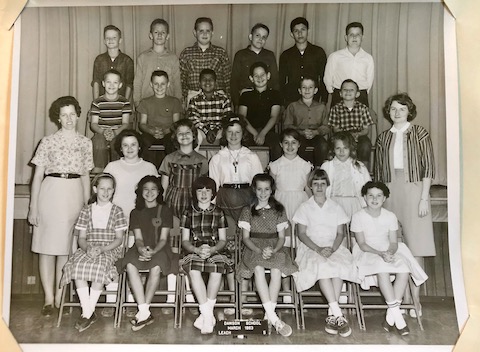 | Class photo from spring of 1963, at Mollie B. Dawson elementary school in south Austin Texas — a crewcut ^z is at the left end of the third row up, wearing a striped shirt.
Coincidence: a decade after ^z shelved books in the school library, Laura Bush (First Lady of the USA 2001-2009) was the Dawson school Librarian (1974-1977) — small world! |
| Student names associated with the 1963 fifth grade class photo, Dawson Elementary School, in Austin Texas, apparently in ^z's own cursive handwriting; many thanks to Rita and Keith Zimmermann for preserving the image! | 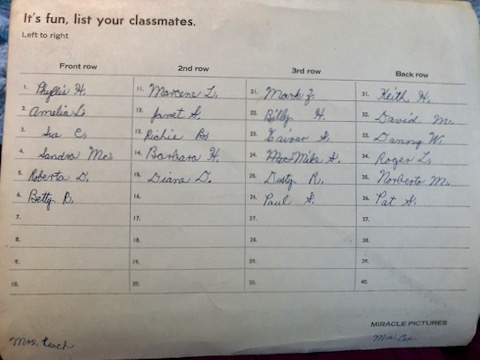 |
- Monday, January 20, 2020 at 05:33:54 (EST)
Could 3D printing or other custom-manufacturing methods create physical artifacts to help people think better? For example:
- Bayesian Belief Bangles — rotating ring bracelets to track likelihoods ...
- Decider Devices — recommender-rosaries to fuse factors and suggest optimal choices ...
- Statistical Sliders — minute mechanisms to accumulate and update uncertainties based on data ...
- Category Theoretic Cogwheels — conceptual constructors to combine concepts and conjure metaphors ...
- Mental Model Musical Machinery — flute-like fluidic causal flow simulators on which to play System Dynamic archetypes ...
... hmmmmm!
(cf Epistemological Enginerooms (2000-08-10), Thinking in Systems (2017-11-03), Reflect (2019-08-25), ...)
- Sunday, January 19, 2020 at 06:59:56 (EST)
Gotta love their attitude: participants in Audax aka Randonneuring strive to prove themselves audacious. They cycle (or use whatever mode of transport is chosen) some crazy distance in some arbitrary time, individually or together, mostly self-supported. According to Randonneurs USA, "Friendly camaraderie, not competition, is the hallmark of randonneuring." Kinda like the best ultrarunning, eh?!
(cf 2011-11-19 - Stone Mill 50 Miler DNF, Audaz - December 2016 Meditation Retreat (2017-01-01), ...)
- Saturday, January 18, 2020 at 05:00:24 (EST)
In her New York Times profile of Mister Rogers Jeanne Marie Laskas describes the end of an interview:
When we were saying goodbye, I thanked him for all he had taught me.
"I think that it is very important to learn that you get that largely because of who you are," he said. "I could be saying the same words and giving the same thoughts to somebody else who could be thinking something very different."
I remember protesting. I was just trying to say thank you.
... such a brilliant observation by Fred Rogers! It's so easy to talk, so hard to hear. There are two ends to every communications channel, both with great responsibility. Each listener gets a different message. And turning the question around — "reversing the arrows" in the Category Theory metaphor — can highlight opportunities on all sides.
(cf Reader as Performer (1999-06-10), Worth Writing Well (2016-08-17), Language, Science, Art (2018-05-24), Receiving (2019-12-22), ...)
- Friday, January 17, 2020 at 02:27:59 (EST)
 | Baby photo, labeled "Mark Zimmermann" in what may be my father Werner Zimmermann's handwriting, likely from ~1953 |
- Thursday, January 16, 2020 at 06:24:45 (EST)
The short 2014 book Rebels at Work by Lois Kelly and Carmen Medina is optimistic and supportive. Its thesis is that organizations, even the largest ones, can benefit from change and innovation led from within by "rebels" — and that those "rebels" can maximize their impact by working in a passionate, positive, mission-oriented way rather than by fighting the System. Yes!
Alas, however, the book displays a curious blind-spot: there's nary a mention of how to recognize, catalyze, and promote other people's great ideas. All the emphasis of Rebels is on effective promotion of one's own suggestions, on overcoming higher-level obstacles, and on recruiting peer-supporters. Surely, once in a while, somebody else thinks of something worthy?
Perhaps a sequel about true Rebel Collaboration and how to build it? With appropriate semi-quantitative rigor, statistical evidence, and models of organizational change and the feedback loops and time delays typically entailed? And rebellion as an emergent phenomenon in a complex adaptive system? Hmmmmm!
(cf Taiji at Work (2015-06-29), 2019-11-07 - Within the System, For the System, With the System, ...)
- Wednesday, January 15, 2020 at 06:30:17 (EST)
Mister Rogers, speaking to Jeanne Marie Laskas in her NY Times profile titled "The Mister Rogers No One Saw", emphasizes the positive :
"... I really want to be an advocate
for whatever I find is healthy or good.
I think people don't change very much
when all they have is a finger pointed at them.
I think the only way people change is
in relation to somebody who loves them. ..." |
... and underscores the centrality of relationship and love.
(cf Ever Is a Long Time (2006-11-23), Groundhog Day 2013-06-19), Mindfulness As a Love Affair (2013-08-10), Mindfulness Retreat - August 2016 (2016-08-31), Positive Thinking Techniques (2017-09-21), Yoneda Friend (2019-11-22), ...)
- Tuesday, January 14, 2020 at 05:33:02 (EST)
 | ... a photo found by my brother, Keith Zimmermann, in our Mother's home — color film was expensive back then, so this must have been taken in a studio ca. 1960 — on the back of the paper frame it says, in what may be Mom's handwriting, "Mark Edward Zimmermann, age 7" — a lower-resolution version is at Mark Zimmermann, Age 7 (2010-07-31) |
| ... likely during a family vacation, this snapshot seems to be of a State of Texas border marker — perhaps my brother Keith (age 5) is seated and ^z (age 7) is waving? |  |
(cf Sixth Grade Photo (2010-07-25), High School Suit (2010-08-15), Zimmermann Family Photo 1965 (2010-09-26), Zimmermann Family Christmas 1958 and 1962 (2010-10-02), Dickerson-Zimmermann Family Photos (2016-05-12), ...)
- Monday, January 13, 2020 at 04:47:02 (EST)
From 2013, The Onion parody anti-terrorism threat warning "Buddhist Extremist Cell Vows To Unleash Tranquility On West" remains hilarious and apt. It begins:
In a 45-minute video posted on Tibetan websites Thursday, Tsuglag Rinpoche, leader of the Buddhist extremist group Kammaṭṭhāna, threatened to soon inflict a wave of peace and tranquility on the West.
Speaking in front of a nondescript altar surrounded by candles, burning sticks of incense, and a small golden statue of the Buddha, Rinpoche did not specify when or where an assault of profound inner stillness would occur, but stated in no uncertain terms that the fundamentalist Buddhist cell plans to target all Western suffering.
"In the name of the Great Teacher, we will stop at nothing to unleash a firestorm of empathy, compassion, and true selflessness upon the West," said Rinpoche, adding that all enemies of a freely flowing, unfettered state of mind will be "besieged with pure, everlasting happiness." "No city will be spared from spiritual harmony. We will bring about the end to all Western pain and anxiety, to all destructive cravings, to all greed, delusion, and misplaced desire. Indeed, we will bring the entire United States to its knees in deep meditation."
"Wisdom and virtue to America!" continued Rinpoche. "Wisdom and virtue to all living things on earth!" ...
... if only!
(cf Shake the Pillars (2008-09-02), National Awareness Month (2009-12-02), ...)
- Sunday, January 12, 2020 at 05:19:39 (EST)
In Nature the essay "Thirteen tips for engaging with physicists, as told by a biologist" is, like all generalizations* wrong — but it's also, like all* generalizations, insightful and fun. Physician-biologist Ken Kosik describes how he transcended disciplines and "... devised a few simple rules to help the biologist in me to cross the divide between the life and physical sciences. In learning to talk to physicists, I discovered that I can communicate better with everyone and clarify for myself what I do and do not understand in my own field."
His 13 tips, summarized:
- Understand what 'I do not understand' means — "... 'Understanding' operates at different planes in different disciplines, and when a physicist seeks understanding, what they hope to grasp might differ from the knowledge that a biologist seeks. ..."
- Seek common ground — "... when physicists ask a biology question, they want to apply the thinking of physics to biology; specifically, they are searching for universal, mathematical explanations. Physicists move away from settled questions. In biology, much less seems settled. Emphasizing what you know is less interesting than saying what you need to learn. ..."
- Recognize the posture of false modesty — "... physicists often display a false modesty regarding their knowledge of biology. A physicist will say biology is much more difficult than physics ..."
- Keep in mind the maths shortfall in biology — "For most biological phenomena, we don't have precise equations – unlike in physics. ..."
- Don't be flummoxed by physicists' maths — "In discussing their own work, physicists will often reach for a formula. After they write the equation and stare at it as if pondering a Mark Rothko painting, they might proffer an explanation. ..."
- Scale matters — "Consider this matter of perspective: most of the time, what a physicist does is much smaller or much bigger, or much colder or much hotter, than anything we biologists do. ..."
- Consider precision — "Physicists require much greater certitude to draw a conclusion. ... For them, attaining a result with a P value of 0.05 is like the chance of hitting a barn door with a baseball: you can't miss it."
- Avoid jargon — "The fastest way to make a physicist's eyes glaze over is to recite biological jargon, such as gene lists and pathways. Come to think of it, it's the fastest way to make anyone's eyes glaze over."
- Skip some details — "Physicists do not want to know about all your controls. They want the concepts ... Physicists make judgements on the basis of clear, cogent, compelling ideas."
- Manage expectations — "Physicists expect you to build your own equipment. ..."
- Understand optimization versus the 'good-enough' principle — "Biological processes carry evolutionary baggage, and therefore arrive at solutions that might not be optimal. ..."
- Consider a physicist's perspective on reductionism — "... Systems approaches to biology that involve large numbers of variables can be inherently interesting to physicists because they conceptually resemble problems in statistical mechanics that relate microscopic and macroscopic properties with very large degrees of freedom – and exact solutions are not possible. ..."
- Physicists laugh a lot — "Not only is the humour of physicists arcane, but almost anything unexpected can provide a jocular moment. Theirs are the ultimate inside jokes, which are often not obviously funny. But laugh along anyway – even if you don't find the humour, they won't know the difference."
*including this one, eh?!
(cf No Concepts At All (2001-02-22), Physics Envy (2001-04-11), Physics Words (2001-10-22), My Speciality (2002-07-28), Theoretically Known (2006-05-29), Helpful Homilies (2007-09-02), What Physics Is (2007-09-16), The Unreasonable Effectiveness of Mathematics (2008-02-17), Know and Do (2009-12-21), Art of Physics (2011-03-01), Humility, Physics, and Philosophy (2011-11-13), Physics Hubris (2012-07-14), Simplicity via Abstraction (2016-01-07), Know and Do (2019-05-25), Operating System of the Universe (2019-10-17), ...)
- Saturday, January 11, 2020 at 04:44:09 (EST)
Inspiration
Innovation
Integration |
... a triplet foundation for new thinking, from a recent conversation with comrade BBR ... perhaps ready to join other trinitarian mantra-mnemonics:
- Be + If + Do
- See + Know + Choose
- Analyze + Assess + Act
- Catalyze + Connect + Create
- Creativity + Insight + Agility
- Attention + Acceptance + Affirmation
- Mindfulness + Nonattachment + Oneness
... !!!
(cf Core Buddhism (2011-10-17), There Are Three Points (2012-05-06), Meditation Map (2019-01-19), Three Things Tactic (2019-09-03), ...)
- Friday, January 10, 2020 at 06:25:33 (EST)
This universe seems so extraordinarily simple — at the level of fundamental particles and fields, or looking at stars and galaxies, or considering a single human life in the context of history, or taking a momentary snapshot of a scene, ...
And this universe is so extraordinary complex everywhere in between!
(cf Personal Cosmology (1999-12-31), Complex Simplicity 2 (2001-10-28), Essential Elements (2003-02-04), ...)
- Thursday, January 09, 2020 at 04:49:40 (EST)
Precision is obvious:
"What noise came with this?"
Recall is subtle:
"How much did we miss?" |
In brief and for practical purposes, look at what we have versus what we omitted:
- Precision is the fraction of what we've got that is Good Stuff
- Recall is the fraction of all the Good Stuff that we've got
It's often easy to measure Precision, since we've got the sample and can study it. It's often hard to measure Recall, since it requires knowing (or at least estimating) what was missing from the sample.
It's often easy to get perfect Precision: just find one good thing and declare victory with that tiny sample! It's often easy to get total Recall: grab everything, including junk, and then nothing good is missed!
There are a host of other ratios to take when sampling the universe of Good Stuff and Bad Stuff. For much too much terminology see Wikipedia on precision and recall, sensitivity and specificity, false positives and false negatives, Type I and Type II errors, and the aptly named Confusion Matrix.
Or just remember to look at both Knowns and Unknowns — and don't be too sure about the difference!
(cf Knowns and Unknowns (1999-07-11), Unknown Knowns (2008-08-29), In the Presence of Oxygen (2017-06-15), ...)
- Wednesday, January 08, 2020 at 05:11:04 (EST)
Relentlessly self-promotional, clearly cynical, yet with some useful ideas: Blake Snyder's book Save the Cat! — The Last Book on Screenwriting That You'll Ever Need (2005) discusses how to produce a "successful" movie script. (The result may not be art, but it may have a better chance to sell to Hollywood.) Summarizing the adroit summary of the book by Phil Gyfford:
- What is it?
- Describe what the movie is about in one sentence. The "logline" should present something unexpected ("The Hook"), elicit a compelling mental image, suggest the target audience and cost of the film, and provide a "killer title".
- Give me the same thing ... only different!
- Identify what film genre your idea fits into; Snyder suggests 10 categories and calls them: Monster in the House; Golden Fleece; Out of the Bottle; Dude with a Problem; Rites of Passage; Buddy Love; Whydunit; The Fool Triumphant; Institutionalized; Superhero.
- It's about a guy who ...
- Create a hero — someone with whom the audience can identify, and who has a compelling goal, is "demographically pleasing", and can support the plot development. Five archetypes whom Snyder suggests are: Young man on the rise, dumb, plucky; Good girl tempted, pure, crazy; Clever and resourceful child; Sex goddess; Hunk.
- Let's beat it out!
- Snyder defines a 15-step template for any script's story arc: Opening Image; Theme State; Set-up; Catalyst; Debate; Break into two; B story; Fun and games; Midpoint; Bad guys close in; All is lost; Dark night of the soul; Break into three; Finale; Final image.
- Building the perfect beast
- Use a storyboard with 40 index cards, one for each major scene.
- The immutable laws of screenplay physics
- Save the Cat: make the hero immediately likeable
- The Pope in the Pool: do any necessary exposition in a surprising context
- Double Mumbo Jumbo: never have more than "one piece of magic per movie"
- Laying Pipe: minimize set-up time before the story gets rolling with the Hook
- Black Vet a.k.a. Too Much Marzipan: don't overdo a bright idea
- Watch Out for that Glacier!: make danger come fast and violently
- The Covenant of the Arc: "Every single character except the bad guys must change over the course of the movie. If the story's worth telling it must be life-changing."
- Keep the Press Out!: build the story within the family or neighborhood; avoid media or other outsiders
- What's wrong with this picture?
- Make the hero active
- Show, don't tell
- Strengthen the bad guy
- Intensify and accelerate the plot as it proceeds
- Evoke diverse emotions throughout the story
- Let dialogue reveal each character's qualities
- Give the characters plenty of room to change during the story
- Be sure the characters are distinctive
- Force goals to be primal
... though of course, to write well one must transcend — and as poet Robert Pinsky says, "There are no rules. However, principles may be discerned in actual practice ...".
(cf savethecat.com, How to Write (2000-11-28), Asimov on Writing (2008-02-02), Pulp Fiction Rules (2008-10-20), Rules for Writing (2010-03-07), Jacques Barzun on Writing (2016-03-19), Fifty Writing Tools (2019-12-29), ...)
- Tuesday, January 07, 2020 at 04:58:55 (EST)
A beautiful thought from Mister Rogers, via the documentary film "Won't You Be My Neighbor" (at ~1:16):
"The only thing that ever really
changes the world is when somebody
gets the idea that love can abound
and can be shared." |
(cf 2018-09-10 - Thank You, Mr Rogers, 143 (2019-11-28), Receiving (2019-12-22), ...)
- Monday, January 06, 2020 at 04:56:44 (EST)
Paolo Perrone's preprint Notes on Category Theory with Examples from Basic Mathematics brings a practical attitude toward introducing deep concepts to non-mathematicians. The author describes his plan: "Not every example is helpful for every reader, but hopefully every reader can find at least one helpful example per concept." His introduction concludes, "If you don't know what any of the above are, don't worry, everything will be introduced shortly. Let's now get started with the math."
And soon enough, in section 2.2 there's the Yoneda Lemma, proven and then summarized:
... if all ways of observing two objects X and Y coincide, then X and Y must be isomorphic. The Yoneda lemma says why: we can observe X in such a way that does not lose any information, namely, mapping it to itself via the identity, idX : X → X. This is an observation that trivially sees the whole of X faithfully. Therefore, this one observation is sufficient to determine X uniquely. And conversely, every other observation, which possibly loses information, is obtainable from this one ...
and as Perrone points out earlier:
... each object of C is uniquely specified by the arrows into it (resp. out if it), up to isomorphism. The objects of a category can be uniquely defined in terms of the role they play in the category, in terms of their "interaction with the whole".
Caveat. This statement can be thought of as rather "philosophical", and it is similar to axioms in philosophy that one can assume true or not (such as the identity of indiscernibles). In category theory, however, this is a theorem, with a proof. It is true in every category.
(cf Yoneda Perspective (2018-10-03), If You Need a Theorem (2018-11-08), Reflect (20129-08-25), Yoneda Friend (2019-11-22), ...)
- Sunday, January 05, 2020 at 04:47:41 (EST)
A tiny secret language, for friends to quietly say the most important things in life:
- 2 = Thank You! → a pair of anything: two winks, two clicks of the tongue, two of an emoji, two breaths together, ...
- 3 = I Love You! → a triplet of anything: three taps on the shoulder, three nods of the head, three knocks at the door, ...
... what more need be said?
🐞 🐞
🐇 🐇 🐇
(cf Most Important (2002-05-16), Indra's Net (2009-06-21), 2018-09-10 - Thank You, Mr Rogers, 143 (2019-11-28), ...)
- Saturday, January 04, 2020 at 04:37:36 (EST)
Peter Wehner, in his New York Times essay "Christmas Turns the World Upside Down", writes about inversion — how the birth of Jesus, and his entire life, was not "... characterized by privilege, comfort, public celebration or self-glorification; it was marked instead by lowliness, obscurity, humility, fragility ...".
Wehner explains how Power can be "made perfect in weakness":
... weakness opens us up to a fundamentally new definition of strength — strength that is not coercive, domineering, prideful and self-seeking but rather compassionate, sacrificial, humble and empathetic. God's power, perfected through our weakness, makes us instruments of mercy, seekers of justice, agents of reconciliation ...
(cf My Business (1999-05-30), Christmas Faith (2000-12-23), Universal Flourishing (2001-12-25), Yes, Virginia (2004-12-26), ...)
- Friday, January 03, 2020 at 05:24:43 (EST)
... consciously operate at deeper levels — spend less time on events (e.g., news) — seek and share trends, patterns, systems, paradigms ...
(cf Systems Thinking Icebergs (2019-06-27), More Meta (2019-08-31), ...)
- Thursday, January 02, 2020 at 06:06:05 (EST)
From Jean Marie Laskas's profile "The Mister Rogers No One Saw", a Zen moment of emptiness and openness and love:
"So the show is like your church?" I asked Fred.
He thought a moment. He said it was easier to say what it wasn't. It was not a show. He used the word "program," never "show."
"An atmosphere," he said. What he was trying to create with "Mister Rogers' Neighborhood" was "an atmosphere that allows people to be comfortable enough to be who they are." He continued: "I really don't want to superimpose anything on anybody. If people are comfortable in that atmosphere, they can grow from there, in their own way.
"A lot of this — all of this — is just tending soil."
He fell silent, as if adding white space around that simple, stark remark.
(cf 2018-09-10 - Thank You, Mr Rogers, Present in Every Moment (2019-11-25), Receiving (2019-12-22), ...)
- Wednesday, January 01, 2020 at 06:06:57 (EST)
"The purpose of computing is insight, not numbers," said Richard Hamming. Ditto for any representation of reality! As beautifully explained by section 3.4 of the 2009 JASON report "Rare Events":
The main use of models
in science is to develop
intuition for hard problems. |
In greater detail:
Predictive models are not the only kind of models scientists use. Insight models are used to build expert intuition — such as visualizing complex datasets, or just helping to modularize and structure the steps in a mental model of a problem. Predictive mathematical modeling is the most scientifically demanding way in which models are used, but it is probably not the main use of models in science. The main use of models in science is to develop intuition for hard problems. Models are used to illustrate, visualize, and analyze a problem, to help human experts see patterns in data, and to systematize an expert's thinking in a way that might reveal key gaps in knowledge about the problem.
An insight model need not be complicated. A simple systematic cartoon on a napkin may suddenly reveal a missing facet of a problem. Other models may be complicated. A red-team exercise may reveal an unanticipated vulnerability; an agent-based simulation may help illustrate inefficiencies and bottlenecks in resource allocation; a social network analysis may help clearly visualize a pattern of connections between people in a large dataset.
Experts develop their own ways of organizing and viewing their data as they think about a problem — such as drawing cartoons showing relationships, or developing a personal system of archiving and indexing data. Experts develop these models for themselves, and they learn from the experience of other experts in their field. Because experts spend most of their time doing their job rather than developing new tools, there is good reason to fund free-standing research and development projects into new (insight) models.
From a programmatic standpoint of funding research, the main problem with standalone research projects that aim to create new (insight) models is that they separate the model's creator from the model's user community, so they tend to face an adoption barrier. Experts are rightly skeptical of new tools developed by non-experts, especially if a model appears complex, mathematical, and highly abstracted rather than hewing closely to real-world data analysis needs. Success of an insight tool should ultimately be judged by how many experts use it and find it indispensable in their work. "Useful to experts" necessarily includes many factors that become just as important as the scientific validity of the model — issues such as software quality and usability, in the case of computer models. Therefore an important part of any research plan to develop new models is the researchers' plan for collaboration and adoption by experts. Will the tool be used and evaluated by real-world analysts? Do they find it useful? Will it spread to other analysts if it is successful? ...
(cf Research and Life (2000-09-07), Great Thoughts Time (2013-11-29), Tolerate Ambiguity (2018-02-01), ...)
- Tuesday, December 31, 2019 at 05:22:52 (EST)
From the excellent book Writing Tools: 50 Essential Strategies for Every Writer (2006) by Roy Peter Clark:
- Begin sentences with subjects and verbs.
- Make meaning early, then let weaker elements branch to the right.
- Order words for emphasis.
- Place strong words at the beginning and at the end.
- Activate your verbs.
- Strong verbs create action, save words, and reveal the players.
- Be passive-aggressive.
- Use passive verbs to showcase the "victim" of action.
- Watch those adverbs.
- Use them to change the meaning of the verb.
- Take it easy on the -ings.
- Prefer the simple present or past.
- Fear not the long sentence.
- Take the reader on a journey of language and meaning.
- Establish a pattern, then give it a twist.
- Build parallel constructions, but cut across the grain.
- Let punctuation control pace and space.
- Learn the rules, but realize you have more options than you think.
- Cut big, then small.
- Prune the big limbs, then shake out the dead leaves.
- Prefer the simple over the technical.
- Use shorter words, sentences and paragraphs at points of complexity.
- Give key words their space.
- Do not repeat a distinctive word unless you intend a specific effect.
- Play with words, even in serious stories.
- Choose words the average writer avoids but the average reader understands.
- Get the name of the dog.
- Dig for the concrete and specific, details that appeal to the senses.
- Pay attention to names.
- Interesting names attract the writer — and the reader.
- Seek original images.
- Reject clichés and first-level creativity.
- Riff on the creative language of others.
- Make word lists, free-associate, be surprised by language.
- Set the pace with sentence length.
- Vary sentences to influence the reader's speed.
- Vary the lengths of paragraphs.
- Go short or long — or make a "turn" — to match your intent.
- Choose the number of elements with a purpose in mind.
- One, two, three, or four: Each sends a secret message to the reader.
- Know when to back off and when to show off.
- When the topic is most serious, understate; when least serious, exaggerate.
- Climb up and down the ladder of abstraction.
- Learn when to show, when to tell, and when to do both.
- Tune your voice.
- Work from a plan.
- Index the big parts of your work.
- Learn the difference between reports and stories.
- Use one to render information, the other to render experience.
- Use dialogue as a form of action.
- Dialogue advances narrative; quotes delay it.
- Reveal traits of character.
- Show characteristics through scenes, details, and dialogue.
- Put odd and interesting things next to each other.
- Help the reader learn from contrast.
- Foreshadow dramatic events or powerful conclusions.
- Plant important clues early.
- To generate suspense, use internal cliffhangers.
- To propel readers, make them wait.
- Build your work around a key question.
- Good stories need an engine, a question the action answers for the reader.
- Place gold coins along the path.
- Reward the reader with high points, especially in the middle.
- Repeat, repeat, repeat.
- Purposeful repetition links the parts.
- Write from different cinematic angles.
- Turn your notebook into a "camera."
- Report and write for scenes.
- Then align them in a meaningful sequence.
- Mix narrative modes.
- Combine story forms using the "broken line."
- In short pieces of writing, don't waste a syllable.
- Shape shorter works with wit and polish.
- Prefer archetypes to stereotypes.
- Use subtle symbols, not crashing cymbals.
- Write toward an ending.
- Help readers close the circle of meaning.
- Draft a mission statement for your work.
- To sharpen your learning, write about your writing.
- Turn procrastination into rehearsal.
- Plan and write it first in your head.
- Do your homework well in advance.
- Prepare for the expected — and unexpected.
- Read for both form and content.
- Examine the machinery beneath the text.
- Save string.
- For big projects, save scraps others would toss.
- Break long projects into parts.
- Then assemble the pieces into something whole.
- Take interest in all crafts that support your work.
- To do your best, help others do their best.
- Recruit your own support group.
- Create a corps of helpers for feedback.
- Limit self-criticism in early drafts.
- Turn it loose during revision.
- Learn from your critics.
- Tolerate even unreasonable criticism.
- Own the tools of your craft.
- Build a writing workbench to store your tools.
(cf Write Many Read Once (1999-11-25), How to Write (2000-11-28), Writing Rewards (2001-06-09), Smell of Good Prose (2006-07-03), Asimov on Writing (2008-02-02), Pulp Fiction Rules (2008-10-20), Rules for Writing (2010-03-07), Worth Writing Well (2016-08-17), Tips for Aspiring Op-Ed Writers (2017-11-18), Writing vs Good Writing (2018-01-21), ...)
- Sunday, December 29, 2019 at 05:17:16 (EST)
Henry's Rule #4:
"Please remember that we are all humans and we will respect you as long as you address us as humans ..."
... such a wise and beautiful thought to see at an impound lot when one's car is taken for illegal parking! |  |
(cf Towed — it happened in 2012)
- Saturday, December 28, 2019 at 07:37:14 (EST)
A thoughtful equestrian friend muses:
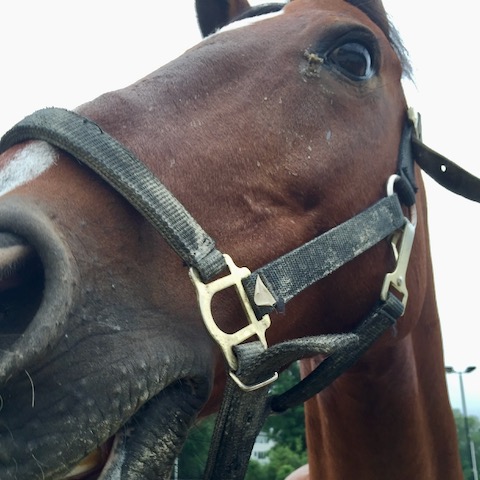 | "My theory is that horses are especially good for girls, to teach them not to be afraid of someone larger or stronger, and to work in partnership with the strength through collaboration and training. Once they learn that, they have some training in not being afraid or pushed around by men, who are generally larger and stronger than they are." |
- Friday, December 27, 2019 at 05:12:35 (EST)
In human fitness theory, Interval Training is the practice of varying workouts to include intensive segments of exercise alternating with recovery segments. It's an example of "polarization", a deliberate widening of the usual distribution of something to include more of the extremes and less concentration near the middle. Interval training builds strength and speed.
So how about Life intervals? Practice daily (or hourly, or weekly, or annually?!) in the face of stress:
- softening — relaxed acceptance of what is
- calming — consciously being less busy
- recovering — active resting
... and contrariwise (of course!) occasionally take mindful "sprints" of hard activity too!
(cf Noise and Predictability (1999-09-14), Long Tails (2000-02-14), Training Tactics (2009-04-09), Power Spectrum Running (2012-09-09), Intermittent Intermittent Fasting, (2019-11-24) ...)
- Thursday, December 26, 2019 at 05:43:18 (EST)
~17.5 mi @ ~15.3 min/mi
 | The Richmond Marathon tells Pokey that his left knee is not ready to run — maybe not for quite a while. Jay Bird offers local lodging and drop-off service for the race. Thank You, Sir! |
| Square Peg and Danger Man accompany Pokey for the first 9 miles, with frequent pauses to take pictures of murals in the Richmond Arts District. Pokey's knee problems increase, so he sends comrades on ahead and walks to the finish area, a bit past mile 16 of the course. | 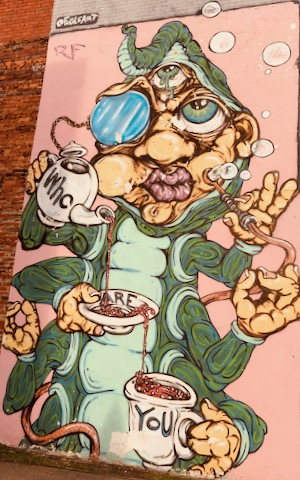 |
 | Richmond street drains feature lovely art. Pokey limps about the end zone, cheers runners and captures photos of his friends when they arrive. It's a lovely day, windy and brisk! |
(trackfile)
- Wednesday, December 25, 2019 at 08:31:59 (EST)
Flawed as he was — as all of us are — Harry Browne (1933-2006) in "The 16 Golden Rules of Financial Safety" offered some sensible suggestions. Several are redundant, many are vague, and a few are rather arguable, but like the advice in Money Wisdom (from the Harper's Bazar magazine of 31 October 1885), one might do far worse. Browne's list, abridged:
- Your career provides your wealth. You most likely will make far more money from your business or profession than from your investments. ...
- Don't assume you can replace your wealth. The fact that you earned what you have doesn't mean that you could earn it again if you lost it. ...
- Recognize the difference between investing and speculating. When you invest, you accept the return the markets are paying investors in general. When you speculate, you attempt to beat that return ...
- No one can predict the future. ...
- No one can move you in and out of investments consistently with precise and profitable timing. ...
- No trading system will work as well in the future as it did in the past. ...
- Don't use leverage. ...
- Don't let anyone make your decisions. ...
- Don't ever do anything you don't understand. ...
- Don't depend on any one investment, institution, or person for your safety. ...
- Create a bulletproof portfolio for protection. ...
- Speculate only with money you can afford to lose. ...
- Keep some assets outside the country in which you live. ...
- Beware of tax-avoidance schemes. ...
- Enjoy yourself with a budget for pleasure. ...
- Whenever you're in doubt about a course of action, it is always better to err on the side of safety. ...
(cf Money Wisdom (2001-05-20), Silver Skepticism (2001-07-29), Bubble Busters (2002-02-06), Dow Theory (2002-07-27), Permanent Portfolio (2003-06-02), Good Fortune (2004-12-12), Financial Planning (2008-03-15), Bad Money Counsel (2010-11-02), Boom Times Loom Soon (2012-08-30), Efficient Frontier (2014-08-27), ...)
- Tuesday, December 24, 2019 at 06:22:03 (EST)
Version 0.5 of the Open Mind OM Cards is in production! It incorporates several enhancements based on experience with earlier editions and recommendations from friends:
- three suits of 17 cards each, marked on the back:
- Be - boundless sky-water-earth
- If - blossoms from flowers
- Do - bright abstract art and other human creations
- one card of commentary:
- suggestions
- Pick a daily card for meditation
- Give a card to help a friend in need
- Make a new card to share with others
- See a card at http://zhurnaly.com/om
- Open Mind Matrix
- Mindfulness - Attention - Meta - Here - Now - Be
- Nonattachment - Acceptance - Open - Soft - May - If
- Oneness - Affirmation - Love - Kind - Yes - Do
- two suitless cards
- improved mint tin box
- top with treasure-sunbeam
- bottom with Open Mind Matrix
... and overall: fewer words, better images, and perhaps more insight!
(cf OM atop every page for a random OM Card, OM Museum for the new deck of 51, Om Museum for all the cards in the prior edition, and historical development notes at One-Mind OM-Cards (2019-11-12) and Open Mind OM Cards (2019-11-19), ...)
- Monday, December 23, 2019 at 06:13:08 (EST)
From "The Mister Rogers No One Saw", a comment by Fred Rogers when author Jeanne Marie Laskas thanks him for all he has taught her — and, with archetypal insight, Mister Rogers reflects the light back onto her:
It's so very hard, receiving.
When you give something,
you're in much greater control.
But when you receive something,
you're so vulnerable.
I think the greatest gift
you can ever give
is an honest receiving
of what a person has to offer. |
(cf 2018-09-10 - Thank You, Mr Rogers, Mr Rogers Asks (2019-11-18), Present in Every Moment (2019-11-25), 143 (2019-11-28), Mantra - Be Tame (2019-12-06), Tikkun Olam (2019-12-11), ...)
- Sunday, December 22, 2019 at 05:06:26 (EST)
Self-awareness applied to food and diet? Ephemeral hype? Deep wisdom? Mere feel-good-ism? "Intuitive Eating" gurus say, "Eat when you're hungry, stop when you're full." Sounds like the Zen proverb:
"Master, what is enlightenment?"
"When hungry, eat. When tired, sleep."
... though the backstory of that is a constellation of mindfulness practice developed over millennia, some fraction of which may have evidence of benefits. Intuitive Eating gurus offer ten principles:
- Reject the Diet Mentality
- Honor Your Hunger
- Make Peace with Food
- Challenge the Food Police
- Respect Your Fullness
- Discover the Satisfaction Factor
- Honor Your Feelings without Using Food
- Respect Your Body
- Exercise—Feel the Difference
- Honor Your Health with Gentle Nutrition
Hard to argue with any of that, vague, redundant, and non-orthogonal as they may be. Data — controlled, statistically sound studies — doesn't seem to exist for increased health, happiness, or success in any other positive dimension related to Intuitive Eating. But there are books and coaches aplenty. Perhaps that's ok — sometimes, for some people. Affirmation and acceptance of oneself, including size, aren't bad. Then again, the same could be said for discipline, quantitative metrics, and achievement.
And there's the inimitable Bob Newhart psychologist-therapist skit that advises, when tempted to do something counterproductive, "Stop It!" ...
(cf [1], [2], [3], ...)
- Friday, December 20, 2019 at 04:58:49 (EST)
The proper response to our beautiful Universe is to live in a state of constant total amazement. From Tom Junod's 1998 profile of Mister Rogers:
... that's what someone in the crowd said while watching Mister Rogers and Maya Lin crane their necks at Maya Lin's big fancy clock, but it didn't even matter whether Mister Rogers could read the clock or not, because every time he looked at it, with the television cameras on him, he leaned back from his waist and opened his mouth wide with astonishment, like someone trying to catch a peanut he had tossed into the air, until it became clear that Mister Rogers could show that he was astonished all day if he had to, or even forever, because Mister Rogers lives in a state of astonishment, and the astonishment he showed when he looked at the clock was the same astonishment he showed when people—absolute strangers—walked up to him and fed his hungry ear with their whispers, and he turned to me, with an open, abashed mouth, and said, "Oh, Tom, if you could only hear the stories I hear!" ...
 | From Stanford Presidential Lectures, on Maya Lin:
"... In 1995 Lin's piece Eclipsed Time was installed in the ceiling of Pennsylvania station in New York city. In this work the clock 'face' is a circular piece of frosted glass with a light source behind it. As the hours pass from noon to midnight, the light source is slowly eclipsed by a moving shield and the glass of the clock face gradually goes from being brilliantly lit to total darkness. ..." |
(cf 2018-09-10 - Thank You, Mr Rogers, Mr Rogers Asks (2019-11-18), 143 (2019-11-28), ...)
- Thursday, December 19, 2019 at 06:19:13 (EST)
Emeritus professor of Chemistry Gary Bertrand (University of Missouri-Rolla) shares a collection of quotes that's by turns hilarious, provocative, and thoughtful. A selection:
- "Less is more, but less is more difficult than it looks." — Grant Snider in Incidental Comics
- "I never wanted to be famous, I just wanted to be great." — Ray Charles
- "We learn more by looking for the answer to a question and not finding it than we do from learning the answer itself." — Lloyd Alexander
- "The problem with theories is that they are either too good to be true, or too true to be good." — F. A. Cotton
- "Before I came here I was confused about this subject. Having listened to your lecture I am still confused, but on a higher level." — E. Fermi
- "In this house, the laws of thermodynamics will be obeyed." — Homer Simpson
- "Anything worth doing is worth doing slow."
- "With all its sham, drudgery, and broken dreams, it is still a beautiful world. Be cheerful. Strive to be happy." — Max Ehrmann
- "Never play Leap-Frog with a Unicorn."
- "If you're not living on the edge, you're taking up too much room."
- "It is not denial — I am just very selective on what I choose to believe is reality."
- "Perfection is achieved, not when there is nothing more to add, but when there is nothing left to take away." — Antoine de Saint-Exupéry
- "We thought we knew the answers, but it was the questions we had wrong."
- "The highest reward for man's toil is not what he gets for it, but what he becomes by it." — John Ruskin
- Tuesday, December 17, 2019 at 06:53:41 (EST)
~15 mi @ ~15.7 min/mi
 | Fun start: Slow Twitch and Pokey set off at 0602, a couple of minutes after everyone else. Conversation is wonderful, as always, between trail friends who haven't seen each other for much too long. After a few miles Pokey sends ST on ahead as he settles into a comfortable trot.
Rough day: At mile 10 the old left knee starts to twinge, and speed-hiking along doesn't make it any better. Next-to-last at the mile 15 aid station, Pokey decides to drop and walk back to the start, half a dozen miles on the road. But within a few steps the knee suddenly "pops" and declares the situation serious. Kind volunteer Dan DiFonzo provides a ride to the finish line. Time for a week of aggressive resting before the Richmond Marathon on the 16th! |
(trackfile)
- Sunday, December 15, 2019 at 19:00:06 (EST)
From Gerard 't Hooft's essay "How to Become a Bad Theoretical Physicist":
- "The difference between a good theorist and a bad one is that good theorists are usually the first to detect the shortcomings of their own theories. ..."
- "... how to become a bad theorist: Compare yourself with Isaac Newton, Albert Einstein, Paul Dirac, or other celebrities in theoretical physics, and reach a conclusion in favor of yourself."
- "You may consider the option of connecting your work with mystery topics such as telepathy and consciousness. Make outrageous claims of having solved long standing problems. ..."
- "... The impudence to attach your own name to whatever you claim to have discovered is considered improper in science, and in practice it betrays amateurism and incompetence. If a good theoretician refers to an equation to which colleagues have attached his/her own name, he/she uses a different description if available. ..."
- "... take your own immature theory, stop checking it for mistakes, don't listen to colleagues who do spot weaknesses, and start admiring your own infallible intelligence ..."
Contrariwise, 't Hooft's outline of how to become a good theoretical physicist is a roadmap of topics to study (for several years) in order to begin (maybe!) to contribute to human knowledge.
- Saturday, December 14, 2019 at 05:16:00 (EST)
In the opposite direction from the likely-apocryphal Ernest Rutherford (or Winston Churchill) saying, "Gentlemen, We Have Run Out Of Money; Now We Have to Think", how about:
For People whose
Cash-to-Brains ratio
is far too high! |
... to describe advertisements for silly products, blatantly bad investments, ridiculous scams, or other attempts to take advantage of those folks blessed with more resources than reason?
- Friday, December 13, 2019 at 05:33:35 (EST)
 | A photo of the Wheaton Public Library basement used-book sale as it was two decades ago — that library building no longer exists — from the Washington Post Sunday magazine of 6 July 1997, with the Dickerson Zimmermann clan (Gray, Paulette, Merle, Mark, Robin) posed as faux customers, with Friends of the Library sales manager Jim Ludlum in plaid shirt. See Michael Dirda's "Chapter and Verse" ... |
- Thursday, December 12, 2019 at 06:11:53 (EST)
From "Won't You Be My Neighbor?", the 2018 documentary film about Mister Rogers (at ~1 hour 24 minutes):
No matter what our particular job, especially in our world today, we all are called to be Tikkun Olam — Repairers of Creation. Thank you for whatever you do, wherever you are, to bring joy and light and hope and faith and pardon and love to your neighbor and to yourself.
... and Thank You, Fred Rogers!
- Wednesday, December 11, 2019 at 04:54:32 (EST)
Often discovering the right way to write something makes it hugely easier to think about it. Examples include many musical notations, the Leibnitz notation for calculus, and Feynman diagrams in physics. A 2007 paper "A Not-So-Characteristic Equation: The Art of Linear Algebra" by Elisha Peterson leads to a new (old?!) rabbit-hole visual-language of Penrose graphical notation that promises potential enlightenment in other areas, including bits of category theory. Peterson suggests:
The emphasis of this paper is on illumination rather than proof, and in particular on how diagrammatic techniques have the power to both prove and explain. For this reason, several examples are included, and more enlightening proofs are preferred. While diagrammatic methods may seem unfamiliar at first, in the end they offer a profound insight ...
We hope that by the end of the paper the reader is both more comfortable with the appearance of diagrams in mathematics and convinced that sometimes, in the words of Richard Feynman, "these doodles turn out to be useful."
(cf BraKet (2001-01-24), Fractal Feynman (2003-01-30), Greatest Inventions (2011-06-09), Category Theory Concepts (2016-04-25), Why Care about Category Theory (2019-03-03), Structure Itself (2019-03-22), Applied Category Theory (2019-04-24), ...)
- Tuesday, December 10, 2019 at 05:15:45 (EST)
From a 2019 essay by Parker Richards, "Philip Pullman's Unorthodox Liberalism", a quote (with greater context) from The Secret Commonwealth: The Book of Dust, as one character says:
"... The other side's got an energy that our side en't got. Comes from their certainty about being right. If you got that certainty, you'll be willing to do anything to bring about the end you want. It's the oldest human problem, Lyra, an' it's the difference between good and evil. Evil can be unscrupulous, and good can't. Evil has nothing to stop it doing what it wants, while good has one hand tied behind its back. To do the things it needs to do to win, it'd have to become evil to do'em."
... just as in W. B. Yeats' poem "The Second Coming", where "The best lack all conviction, while the worst / Are full of passionate intensity." It's a fundamental asymmetry, and maybe it could be part of the definition of Good vs Evil?
And yet, somehow Good will triumph, ultimately — not by becoming Evil but by staying Good! (Is that what "faith" means?)
(cf My Religion (2000-11-06), Religion and Reverence (2001-07-08), Mantra - Widen the Skirts of Light (2018-01-06), 2019-11-07 - Within the System, For the System, With the System, ...)
- Monday, December 09, 2019 at 04:54:11 (EST)
Science is like a gigantic set of jigsaw puzzles. Doing science is like finding pieces for various of those puzzles — involving physics, economics, chemistry, sociology, psychology, biology, etc. — and trying to fit them into place. The best (and/or luckiest) scientists find lots of pieces, big pieces, maybe edge or even corner pieces, that hook well with other pieces and add major elements to the jigsaw puzzle picture that's taking shape. Often pieces don't quite fit and need to be replaced with other pieces, years or centuries later. Sometimes the picture that's emerging turns out to be completely different than what it once appeared to be. Mathematicians and philosophers study the forms of the puzzle pieces, the characteristics of the image fragments on the pieces, and the big-picture possibilities that they contribute to. It's all a huge shared game that people have been working on together for millennia. Kinda amazing!
(cf On Somethingness (2000-01-17), Science and Pseudoscience (2001-10-06), Coincidental Taxonomy (2001-10-19), Webs of Evidence (2000-02-15), No Concepts At All (2001-02-22), Altered Native (2002-01-24), Coincidental Taxonomy 2 (2002-05-14), Big Picture Fallacy (2003-01-22), Seeing Nature (2005-07-19), Music of the Primes (2011-08-11), ...)
- Sunday, December 08, 2019 at 06:16:52 (EST)
Three wise quotes (possibly apocryphal? - via Paul Kedrosky) from physicist Ernest Rutherford (1871-1937):
- "If your experiment needs statistics, you ought to have done a better experiment."
- "You should never bet against anything in science at odds of more than about 1012 to 1."
- "The only possible interpretation of any research whatever in the 'social sciences' is: some do, some don't."
... in other words:
- be skeptical
- don't be too skeptical
- seek and weigh quantitative evidence for claims — especially when they involve complex systems like human beings
(cf High Precision (2002-07-16), ...)
- Saturday, December 07, 2019 at 13:03:25 (EST)
... from the documentary film Won't You Be My Neighbor?, at ~30 minutes, when Mister Rogers is talking as puppet "Daniel Striped Tiger":
Well, it took me so long to get tame. I try to understand how everybody else is working at it. Sometimes it isn't easy.
... and yes, it's such hard work to be tame in the positive sense — soft, gentle, kind, fearless — and it takes a lot of patience, self-love, and forgiveness ...
And it's so important to try!
- Friday, December 06, 2019 at 05:58:53 (EST)
~2.9 mi @ ~17.2 min/mi
"Pit bulls are so misunderstood!" suggests Pitbull.
"And there are a lot of misunderstood things that I don't need to bring into my home!" replies Plato. Is that unfair? "I go back-and-forth about fairness," he confesses. Intriguing philosophy!
Dawn Patrol dashes across the highway to Starbucks, where a GPS glitch adds 0.8 imaginary miles. We share career advice, reminisce about past runs, compare coffees, and concur on the need to take care of each other.
(trackfile)
- Thursday, December 05, 2019 at 06:07:34 (EST)
David Allen, productivity consultant-guru, wrote a decade ago about the dangers of overthinking-and-rationalization, versus the value of decide-and-do:
Thinking can be counterproductive — at least what people sometimes parade as thinking. Real thinking is always a good thing, but many people pretend that replaying a tape in their head about something is actually thinking about it.
Many times our workflow coaching clients want to give us long involved stories about an e-mail sitting in their inbox. It's as if they're defending a doctoral thesis, going to great lengths to explain why it showed up, what it means, and why it's still sitting there. They want us to know their thinking. They seem to feel that if they tell us enough about it, it justifies the space it's taking up in their virtual and psychic world.
We listen attentively and then just ask, "What's the next action?" After a slight twitch ("Don't you care about all the reasons this is here?"), they swallow hard and engage in the executive decision-making that invariably ensues when they gear down to operational reality. Thinking is required, but at a different level. Continually thinking the same way about something (usually in frustration or irritation) is avoidance. Thinking about what has to happen to move something forward to resolution, clarity, or completion is highly functional. Well-analyzed "stuff" is still "stuff." It must yet be composted into the primary elements of the commitment you have about the result to be achieved and the next action required to fulfill that agreement with yourself. In other words, you need to figure out what it means and what you want to do about it.
But that kind of thinking generates a pledge to action, and that's risky business. When you start to move on making anything actually happen, you confront a subtle but significant angst — the project and the actions involved in it might never be as wonderful, as perfect, as solid, and as safe as in the sanctity of your imagination. It's like stepping off the end of the pier — and how deep is that water anyway?
But when you make that leap of faith and down shift into action, a weird thing happens. Real intelligence, creativity, and solidity show up — in a much greater way than ever it could, trying to be managed merely in your head. Putting the limitation of physicality onto what you're thinking about does not constrain the mind — it actually galvanizes it. The water's deep, but it's an ocean of possibility.
... it's the progression see → know → choose ... though of course one must not leap ahead to act and forget to analyze and assess!
(cf Knowing Choosing Doing (1999-05-29), Getting Things Done - Summarized (2012-05-14), David Allen Summarized (2014-04-29), Mantra - Mind Like Water (2015-05-04), Getting Things Done Practices (2018-10-10), ...)
- Wednesday, December 04, 2019 at 06:00:09 (EST)
Veteran ultrarunner John Dodds in his report "2002 MMT 100: No Mas?" provides a hilarious glimpse into the challenges during (and after!) a tough hundred miler. A few of the best (mostly-family-audience-safe) bits:
Did there ever come a time when you're engaging in an activity, and you slowly realize that maybe this activity isn't for you? This happened to me at the MMT 100 while I was running at night on my way to Powell's Fort. Due to severe chafing, I had taken off my running shorts and was running half "nekkid." I looked down at my hands, and they were so swollen they looked like they belonged to the Michelin Man. Together with my performance last year, I've turned misery into an art form. ...
and
... Before the 2002 MMT, I had run and finished three 100s. They could have been more pleasant experiences. In fact, my next 100 was going to be a test to see if I could have more "fun." That meant no chafing, no queasiness, no listlessness during the night, etc. If it weren't more fun, then I might just come to the slow realization that running 100s just isn't for me. ...
and
... As I sat there at Powell's Fort, I looked at my watch. It was 0540. I had 2 mountains to climb and 12 miles to go. I was in no condition to run, and I figured it would take me about 6 hours to walk (too painful to run). I had replaced my running shorts with sweat pants from my drop bag, figuring that would help with the chafing. It didn't. And off I went. As I said, I finally made it to Elizabeth Furnace and sat on a bench there for a long time. I had to go to the bathroom and asked if there was one there. They pointed about 100 feet away. I groaned. How could I possibly walk that far? I figured that walking to the bathroom would be a test. If I could get up off the bench and walk, then I could make it over one more mountain and make it to the finish 5 miles away. I know this is going to seem somewhat unbelievable, but once I sat down in that restroom I was very comfortable. It was dank and cool. Having minimal mental faculties at that time, I figured I had 2 options: (1) I could sit in there until the aid station closed and ride to the finish with the volunteers (this was my preference), or (2) I could spend another 3 hours in pure misery climbing up and down over another mountain. I decided to press on. ...
and
... And then there's Gary who got stronger and faster during the run and set a PR of 27:21. I can't wait until I get as old as him so I can be a good runner. Several days after the run, my daughter, age 7, was pointing out a flower to me in the yard. I told her that I run with a person who points out all the flowers he sees on the way. Displaying a wisdom beyond her tender years, she asked me: "Isn't that annoying?" ...
and
... After the race when I took my shoes off, I discovered that the lump on the bottom of my left foot was not my sock scrunching up as I had thought. It was a huge blister. This had been bothering me for some time during the latter portion of my "walk" but it didn't seem to be all that important considering the chafing problem. Another problem that developed about midway was a tenderness in my left ankle. I don't recall ever turning my ankle, but it got sore as time went on. The next day my ankle and foot were all swollen, thus putting pressure from the inside-out on my blister. I could barely walk. The evening after the race, I was lying in bed on a towel (to protect the sheets from a seeping butt — not pleasant but true) with nothing on except two icepacks on my feet. The phone rang, and I was annoyed because I just knew it was going to be a cold call from someone trying to sell me part of a time share in some Loosiana bayou. But it was worse — it was Gary. "Hi, John, do you want to take off next Monday and go run the Priest?"
But we had a good conversation, centering mainly on anti-chafing measures. It was a very detailed discussion, using complex terms in reference to the male anatomy that would have made a Supreme Court justice blush. Over the next several days, my chafing wounds went away (it was so pleasant not to wear regular underpants plus flannel boxers with my suit here at work). My foot was back to normal size by the following Saturday, and I was walking without a limp. The dead layer of skin has come off the bottom of my foot, leaving a healthy-looking membrane that keeps the muscle enclosed. And what about running? Well, I haven't yet. But: I have since bought new underwear, new shorts as well as a new pair of shoes. As the saying goes: I'm all dressed up with no place to go. ...
... and that's ultramarathon running!
(cf 2010-05-15 - Half Massanutten Mountain Trails, ...)
- Tuesday, December 03, 2019 at 06:17:36 (EST)
Interesting questions seem to revolve around the challenge of self and how (or if?) to frame it:
- No-Self — "... centered on no particular thing, but on all things ..." (Charlotte Joko Beck)
- One-Self — "... given responsibility, over time, so that it can reliably be there to take responsibility ...." (Daniel Dennett)
- All-Self — "... folded into the universe and participate in its unfolding ..." (Jon Kabat-Zinn)
... perhaps undefined, unanswerable challenges of free will, agency, worthiness, existence, awareness, attachment, identity — perhaps illuminated by thinking about the absence-or-presence of other "selves" — and perhaps worth thinking (and not-thinking?) about!
(cf Unselfing (2009-01-14), Unselfing Again (2009-11-01), Nonattachment to I (2012-01-15), Misplaced Concreteness (2013-07-02), Anatman Living (2013-07-13), Bodhichitta, Maitri, Shunyata (2014-07-16), No-Self and the Space of Wonder (2014-10-20), No-Self (2014-12-25), Befriending the Self (2015-05-15), ...)
- Monday, December 02, 2019 at 06:37:16 (EST)
Fred Rogers ("Mister Rogers") in a 1999 interview (full version) said:
You know, my mother used to say, a long time ago, whenever there would be any real catastrophe that was in the movies or on the air, she would say, "Always look for the Helpers. There will always be Helpers, you know, even just on the sidelines." That's why I think that if news programs could make a conscious effort of showing rescue teams, of showing medical people, anybody who is coming into a place where there's a tragedy — to be sure that they include that — because if you look for the Helpers, you'll know that there's hope.
... as for example, in this photo by John Tlumacki taken moments after the 2013 Boston Marathon bombing:
(cf The Defenders (2002-05-27), ...)
- Sunday, December 01, 2019 at 18:02:46 (EST)
In the The Zen of Weight Lifting (New York Times, November 2019) author Brad Stulberg speaks of nonattachment through the lens of strength training. He lists three human needs for self-actualization:
- Autonomy: The ability to exert oneself independently and have control over one's actions.
- Mastery: A clear and ongoing path of progress that can be traced back to one's efforts.
- Belonging: Being part of a community, lineage or tradition that is working toward similar goals.
... and quotes George Leonard from The Way of Aikido. In greater context, Leonard wrote:
... to learn anything significant, to make any lasting change in yourself, you must be willing to spend most of your time on the plateau, to keep practicing even when it seems you are getting nowhere. Not only that, but to join those on the path of mastery, it's best to love the plateau, to take delight in regular practice, not just for the extrinsic rewards it brings, but for its own sake. ...
... that is, No Goals!
(cf For Themselves (2003-06-08), This Is It (2008-11-14), That Feeling of Weightlessness (2012-06-23), No Method (2010-01-21), Live the Questions Now (2015-04-02), Mantra - Stress, Recover, Improve (2015-07-10), Om - Be Here, ...)
- Saturday, November 30, 2019 at 09:12:05 (EST)
~4.7 mi @ ~14.3 min/mi
 | "Work within the System, for the System, and with the System — not against the System!" Square Peg counsels the path of progress and peace, though with a footnote: "But if the System is unjust, move up to work within the larger System!"
"And if they go low", Pokey concurs, "we have to try to go high — even if it's scary and slow and hard. Because it's right." Dawn Patrol takes a mindful tour of McLean, pausing to praise a chiaroscuro sunrise.
"You are a Maker. Help me be one, please!" We resolve to let go of self-criticism, even if only a little, and to get a few more things done, even if they're imperfect. Crimson clouds embrace the glorious world. We're thankful, happy to be here and do what we can to help. |
(trackfile)
- Friday, November 29, 2019 at 05:41:30 (EST)
From Tom Junod's profile essay of Mr Rogers, "Can You Say Hero", on a personal way to say "I Love You":
... Mister Rogers weighed 143 pounds because he has weighed 143 pounds as long as he has been Mister Rogers, because once upon a time, around thirty-one years ago, Mister Rogers stepped on a scale, and the scale told him that Mister Rogers weighs 143 pounds. No, not that he weighed 143 pounds, but that he weighs 143 pounds. ... And so, every day, Mister Rogers refuses to do anything that would make his weight change—he neither drinks, nor smokes, nor eats flesh of any kind, nor goes to bed late at night, nor sleeps late in the morning, nor even watches television—and every morning, when he swims, he steps on a scale in his bathing suit and his bathing cap and his goggles, and the scale tells him that he weighs 143 pounds. This has happened so many times that Mister Rogers has come to see that number as a gift, as a destiny fulfilled, because, as he says, "the number 143 means 'I love you.' It takes one letter to say 'I' and four letters to say 'love' and three letters to say 'you.' One hundred and forty-three. 'I love you.' Isn't that wonderful?"
(cf 2018-09-10 - Thank You, Mr Rogers, ...)
- Thursday, November 28, 2019 at 08:53:54 (EST)
~3.7 mi @ ~13.7 min/mi
"And that's the physical chemistry behind your hand warmers!" the lecture concludes. On a chill morn Peg lends Pokey her gloves. Plato runs with hands in pockets, where outer-shell electrons find lower energy levels as iron atoms disrupt oxygen molecules. An amber sunrise reminds Dawn Patrol to give thanks for Standard Time on the way to Starbucks, where we welcome warm coffee.
"So what comes next? Quantum blockchains are so last month!" Pokey speculates that whatever it is will involve new levels of abstraction, not just playing the same old games bigger and faster. Meta, anyone?
(trackfile - cf Do Meta (1999-05-08), Higher Level Language (2007-08-17), One Transcend Suffices (2009-10-14), More Meta (2019-08-31), ...)
- Wednesday, November 27, 2019 at 05:50:07 (EST)
In the film Deadpool 2, the kind, quiet, honest, gigantic, metallic superhero Colossus has the beautiful-wise lines (said in a faux-Russian accent):
This is what friends do.
They show up!
Not when convenient or easy.
When hard. |
(cf Mantra - Ditto (2015-08-30), Mantra - I'm In (2015-10-12), Mantra - For Us (2015-11-28), Mantra - You Are Loved (2016-01-10), ...)
- Tuesday, November 26, 2019 at 06:02:29 (EST)
From the profile "The Mister Rogers No One Saw" by Jeanne Marie Laskas in the New York Times magazine of 24 Nov 2019:
"It's so hard, isn't it?" he said. "I think there are many people who bring a whole lot of baggage from their past and a whole lot of anxiety about the future to the present moment. What's so great is that people can be in relationship with each other for the now."
"Yeah," I said.
"If we can somehow rid ourselves of illusions," he said. "The illusion that we are greater or lesser than we are. The illusion that we're going to save the world. There are a lot of illusions that people walk around with. I would love to be able to be present in every moment I have."
(cf Present-Moment Reality (2008-11-05), Kundun (2010-03-31), Mindfulness for Beginners (2013-07-18), Aspiration, not Expectation (2014-12-12), ...)
- Monday, November 25, 2019 at 06:15:14 (EST)
~20 mi @ ~17 min/mi
 | "Oh! Deer!" Square Peg spies a big buck picking his way through the brush of a downtown DC pocket park. We're ~3 miles into the Potomac Heritage 50k and Pokey diverts for the photo op. Dipak waits patiently. Today's a recovery run for some, a training trek for others, and a wonderful chance to be with friends for all. The stag staggers away after posing for a pic. |
| "Intermittent intermittent fasting!" recommends Dipak, rather than consistent intermittent fasting which he figures his body might get accustomed to. We pass Brian Kolb, hiking along with a massive kettlebell in his backpack, and chat with Paul Crickard and Smitty (Francesco Smith), both of whom are out enjoying the day. At mile 10 Peg punches out, so she can fulfill prior promises. |  |
 | "It's an ancient boiler, used to power stonecutting machinery at a quarry here more than a century ago!" Pokey explains his theory about a metal mystery cylinder near the Potomac River bank. (Dear friend Mary Ewell posed for a photo here during the 2007-12-02 - PHT plus C-and-O Loop.) We arrive at the Chain Bridge aid station too late to continue upstream, and head back for a 20 mile DNF. Pokey bobs for apples, for the first time in his life, and succeeds — yay! |
(trackfile)
- Sunday, November 24, 2019 at 13:17:23 (EST)
In mathematical Category Theory the "Yoneda Lemma", according to some popularizations anyway, says that all things are entirely defined by their interconnections with other things. (OK, it's talking about ideal algebraic-geometric-topological structures on a platonic plane, but hey, it's a meta-metaphor!)
Thus Nouns don't count; Verbs do. All that is follows from the patterns of linkages among things. People too, from the lifetime perspective, are entirely defined by their relationships.
And "What's in a name?" Shakespeare was right: nothing!
(cf Roses by Other Names (2004-02-01), Liberal Education (2005-11-02), Greatest Inventions (2011-06-09), Core Buddhism (2011-10-17), Category Theory Concepts (2016-04-25), If You Need a Theorem (2018-11-08), ...)
- Friday, November 22, 2019 at 06:09:29 (EST)
For back issues of the ^zhurnal see Volumes
v.01 (April-May 1999),
v.02 (May-July 1999),
v.03 (July-September 1999),
v.04 (September-November 1999),
v.05 (November 1999 - January 2000),
v.06 (January-March 2000),
v.07 (March-May 2000),
v.08 (May-June 2000),
v.09 (June-July 2000),
v.10 (August-October 2000),
v.11 (October-December 2000),
v.12 (December 2000 - February 2001),
v.13 (February-April 2001),
v.14 (April-June 2001),
0.15 (June-August 2001),
0.16 (August-September 2001),
0.17 (September-November 2001),
0.18 (November-December 2001),
0.19 (December 2001 - February 2002),
0.20 (February-April 2002),
0.21 (April-May 2002),
0.22 (May-July 2002),
0.23 (July-September 2002),
0.24 (September-October 2002),
0.25 (October-November 2002),
0.26 (November 2002 - January 2003),
0.27 (January-February 2003),
0.28 (February-April 2003),
0.29 (April-June 2003),
0.30 (June-July 2003),
0.31 (July-September 2003),
0.32 (September-October 2003),
0.33 (October-November 2003),
0.34 (November 2003 - January 2004),
0.35 (January-February 2004),
0.36 (February-March 2004),
0.37 (March-April 2004),
0.38 (April-June 2004),
0.39 (June-July 2004),
0.40 (July-August 2004),
0.41 (August-September 2004),
0.42 (September-November 2004),
0.43 (November-December 2004),
0.44 (December 2004 - February 2005),
0.45 (February-March 2005),
0.46 (March-May 2005),
0.47 (May-June 2005),
0.48 (June-August 2005),
0.49 (August-September 2005),
0.50 (September-November 2005),
0.51 (November 2005 - January 2006),
0.52 (January-February 2006),
0.53 (February-April 2006),
0.54 (April-June 2006),
0.55 (June-July 2006),
0.56 (July-September 2006),
0.57 (September-November 2006),
0.58 (November-December 2006),
0.59 (December 2006 - February 2007),
0.60 (February-May 2007),
0.61 (April-May 2007),
0.62 (May-July 2007),
0.63 (July-September 2007),
0.64 (September-November 2007),
0.65 (November 2007 - January 2008),
0.66 (January-March 2008),
0.67 (March-April 2008),
0.68 (April-June 2008),
0.69 (July-August 2008),
0.70 (August-September 2008),
0.71 (September-October 2008),
0.72 (October-November 2008),
0.73 (November 2008 - January 2009),
0.74 (January-February 2009),
0.75 (February-April 2009),
0.76 (April-June 2009),
0.77 (June-August 2009),
0.78 (August-September 2009),
0.79 (September-November 2009),
0.80 (November-December 2009),
0.81 (December 2009 - February 2010),
0.82 (February-April 2010),
0.83 (April-May 2010),
0.84 (May-July 2010),
0.85 (July-September 2010),
0.86 (September-October 2010),
0.87 (October-December 2010),
0.88 (December 2010 - February 2011),
0.89 (February-April 2011),
0.90 (April-June 2011),
0.91 (June-August 2011),
0.92 (August-October 2011),
0.93 (October-December 2011),
0.94 (December 2011-January 2012),
0.95 (January-March 2012),
0.96 (March-April 2012),
0.97 (April-June 2012),
0.98 (June-September 2012),
0.99 (September-November 2012),
0.9901 (November-December 2012),
0.9902 (December 2012-February 2013),
0.9903 (February-March 2013),
0.9904 (March-May 2013),
0.9905 (May-July 2013),
0.9906 (July-September 2013),
0.9907 (September-October 2013),
0.9908 (October-December 2013),
0.9909 (December 2013-February 2014),
0.9910 (February-May 2014),
0.9911 (May-July 2014),
0.9912 (July-August 2014),
0.9913 (August-October 2014),
0.9914 (November 2014-January 2015),
0.9915 (January-April 2015),
0.9916 (April-July 2015),
0.9917 (July-September 2015),
0.9918 (September-November 2015),
0.9919 (November 2015-January 2016),
0.9920 (January-April 2016),
0.9921 (April-June 2016),
0.9922 (June-July 2016),
0.9923 (July-September 2016),
0.9924 (October-December 2016),
0.9925 (January-February 2017),
0.9926 (March-April 2017),
0.9927 (May-June 2017),
0.9928 (June-October 2017),
0.9929 (October-December 2017),
0.9930 (December 2017-March 2018),
0.9931 (March-April 2018),
0.9932 (May-July 2018),
0.9933 (July-September 2018),
0.9934 (September-December 2018),
0.9935 (December 2018-February 2019),
0.9936 (February-April 2019),
0.9937 (April-July 2019),
0.9938 (July-August 2019),
0.9939 (August-November 2019),
0.9940 (November 2019-February 2020),
0.9941 (February-June 2020),
0.9942 (June-August 2020),
0.9943 (August-November 2020),
0.9944 (November 2020-March 2021),
0.9945 (March-July 2021), ...
Current Volume.
Send comments and suggestions to z (at) his.com. Thank you! (Copyright © 1999-2021 by Mark Zimmermann.)
^zhurnaly - Random - Recent - Running - Mantra - Tarot - Help
















